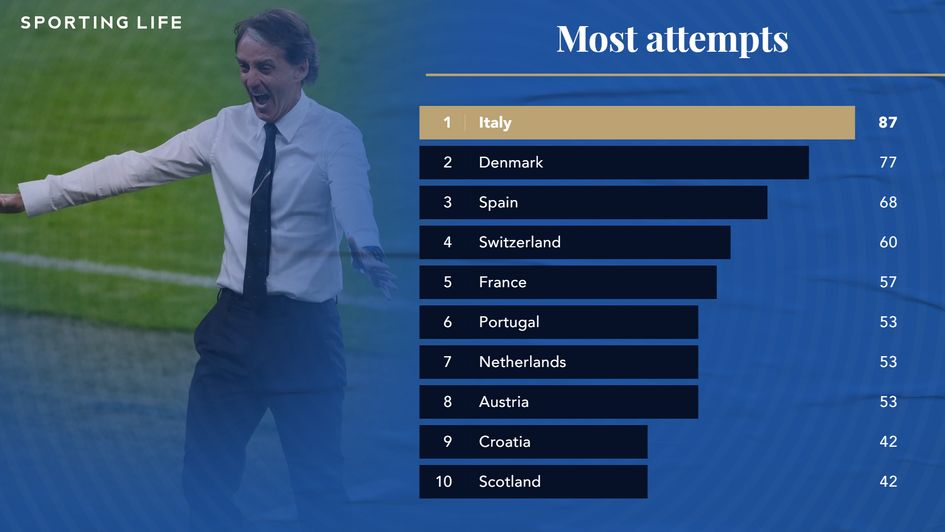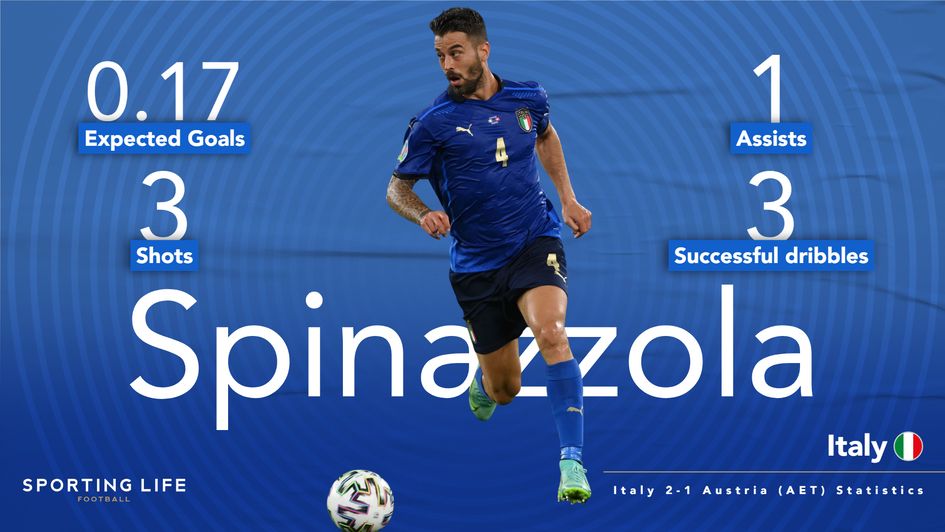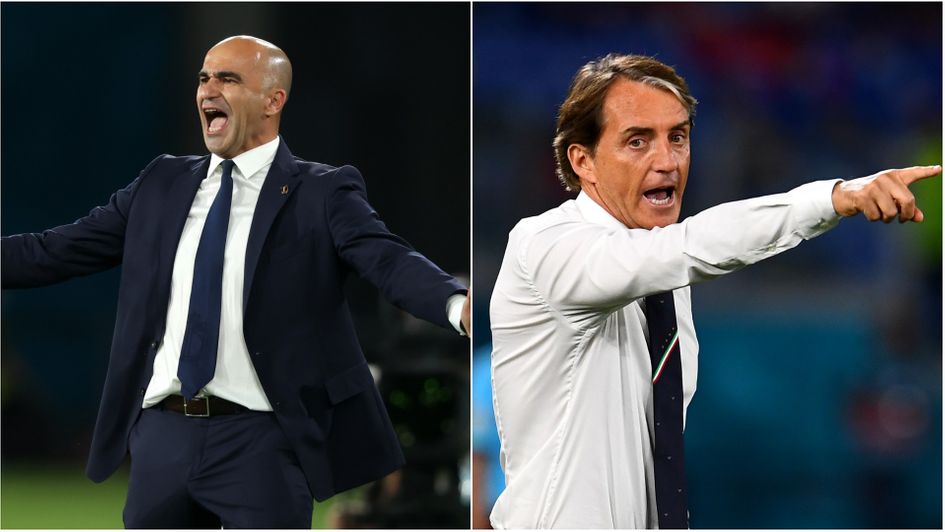There are plenty of narratives worth exploring as Belgium gear up to take on Italy in the quarter-finals of Euro 2020, but perhaps none more so than the Italianisation of Belgium, and the Belgianisation of Italy.
These two nations have both been on their own unique journeys to get to where they are today, and while they are at different stages of their development, there are some interesting parallels between the two, parallels that make this game even more exciting; almost as if Belgium and Italy were always destined to meet in this way.
Belgium’s journey is obviously a longer one, beginning when Roberto Martinez succeeded Marc Wilmots as manager in 2016, but there was a pivotal moment in the development of this Red Devils side, a moment that changed the trajectory of their journey, a 1-0 defeat by France in the 2018 World Cup semi-final.
Russia 2018 was to be the tournament that Belgium finally won, their best players all at the peak of their powers, and after a come-from-behind 3-2 victory over Japan, followed by a masterclass against Brazil, beating the South American side 2-1, it looked as though the stars were beginning to align for Martinez’s men.
The trouble was, Belgium tried to win the World Cup by simply outscoring opponents, intent on playing expansive, entertaining, attacking football that would ultimately prove their undoing.
In the group stage of the World Cup, Belgium had a total of 38 shots, scoring nine goals, and while they only conceded two, they allowed 26 shots, including 13 against Tunisia.
Against Japan they conceded eight shots, and against Brazil 16, but it was working - they were outscoring the opposition. Until they met France.
Belgium dominated the game in terms of possession, and for much of the tie it looked as though Didier Deschamps’ men were under pressure, but in reality that was never the case.
France surrendered the ball in exchange for space in behind the Belgians, and though the goal ultimately came from a corner, Les Bleus created much better chances throughout, but, crucially, limited Belgium to very little going the other way, Martinez’s side racking up a meagre 0.54 expected goals.
In this moment the truth seemed to dawn on Martinez, the truth about pragmatic, defensive football, and we have seen a considerable shift in Belgium’s style of play since that match.
Have Belgium found a new way to play?
Belgium have conceded just one goal at Euro 2020 so far, and against Portugal on Sunday evening they demonstrated just how far they have come as a team, surrendering the ball to the Portuguese in order to expose them on the counter.
The match was almost a carbon copy of the semi-final three years prior, except this time it was the Belgians who were the pragmatic ones, and this time it was Belgium who emerged victorious.
🚀🇧🇪 It was far from vintage from Belgium's Golden Generation but their only shot on target - a speculative one from Thorgan Hazard (0.03 xG) - was enough to reach the quarter-finals.
— Sporting Life Football & Infogol (@InfogolApp) June 27, 2021
❌ Portugal had plenty of attempts but couldn't make any count 👇#BEL #BELPOR #Euro2020
However, was this a masterstroke from Martinez, or have Belgium been fortunate?
Though they have conceded just the once, they have lost the Expected Goals battle in two of their four matches, conceding better chances to the opposition, although it must be said that the majority of the chances Portugal created were long-distance efforts.
Similar to the situation Gareth Southgate finds himself in with England, Martinez has a plethora of world-class players at his disposal, but he has realized that the team must be more than just the sum of its parts, even if those parts are outstanding.
Kevin de Bruyne is arguably the best midfielder in the world at present but injuries mean he has only played 192 minutes for Belgium this tournament, and though they do lack in attack when he is not in the side, Martinez has developed a strategy whereby they can be extremely difficult to beat even without a player of his talent.
Eden Hazard has spent much of the season out injured, so Martinez relying on him to drag Belgium out of the mire simply was not an option, thus he shifted the whole dynamic of the team, and it is the word “team” that is important here.
How Belgium have harnessed the power of Italian defending
Belgium’s back three against Portugal had a combined age of 101, but none of Toby Alderweireld, Thomas Vermaelen or Jan Vertonghen ever really looked under threat in the game, and that is because of the way the team played as a whole.
Indeed, it is perhaps also down to that trio's age and limitations that Belgium have been forced to play in a more measured style, unable to maraud forward as a team because they would leave their three 30-plus centre-halves completely exposed.
Martinez attempted to move on from these three early on in the tournament, playing the younger Jason Denayer at the heart of the back three, but the Spanish coach reverted to his trusted trio for the biggest game of their tournament so far, and it is actually quite remarkable how those three defenders resemble Andrea Barzagli, Leonardo Bonucci and Giorgio Chiellini, who comprised Italy’s back-line for many years.
Axel Witsel was particularly crucial to this against Portugal, recovering from injury to make his first start at the tournament. The Borussia Dortmund midfielder marshaled the centre of the pitch, marking spaces and making life incredibly difficult for Palhinha, Joao Moutinho and Renato Sanches, while protecting his defence incredibly well.
Belgium’s shift in philosophy has been interesting to watch, and the idea that they now more closely resemble a traditional Italian team than the actual current Italian team gives this meeting an interesting edge.
How has Roberto Mancini transformed Italy?
Italy are nowhere near as far along their development path as Belgium are, and though their journeys have been different, Roberto Mancini completely reinventing this team, the rejuvenation of Italy also stems from a particular match or, to be specific, two matches - their 1-0 play-off aggregate defeat by Sweden in November 2017, a result that saw them miss out on a World Cup for the first time since 1958.
Two days later, Gian Piero Ventura was relieved of his position as head coach and, after a brief spell with Luigi di Baggio as caretaker manager, Mancini was appointed in May 2018.
The rest, as they say, is history.
Italy qualified for the 2020 European Championship with 10 wins from 10 matches - the only other side to do that? You guessed it, Belgium.
Mancini has transformed a lifeless, limp, directionless team into a well-drilled yet free-flowing, defensively solid but entertainingly attacking, efficient winning machine, and in drawing 0-0 with Austria in normal time in the last 16 at Wembley, they set a new national record of 31 games unbeaten.
Sasa Kalajdzic's header ended a run of 1,168 minutes without conceding a goal for the Azzurri, but it is not just the defensive solidity that the Italians should be praised for - their attacking play, particularly during the group stage of this competition, has been outstanding.
Italy's new attacking philosophy
Prior to this tournament Italy had never scored more than two goals in a single game at a European Championships - two games into this one and they had broken that hoodoo twice, netting three times against both Turkey and Switzerland.
They created plenty of chances against Wales, even before Ethan Ampadu’s red card, and though they were not quite at their brilliant best against Austria, they still managed to get off 18 shots, creating 2.24 expected goals across the 120 minutes.
Italy are joint-second top scorers at Euro 2020, with only Spain able to better the nine goals they have scored. They are 10 clear at the top of the attempts chart, and only Spain have recorded more attacks in the tournament so far.

In Lorenzo Insigne, Domenico Berardi, Federico Bernardeschi and Federico Chiesa they have four wide players who would walk into the vast majority of teams at this competition, and with the discipline and work rate that the midfield three have demonstrated so far, these attacking players are given plenty of license to express themselves in a way that Italy teams of the past would not have allowed.
In addition, the lack of a star name has almost forced Italy to retreat from their defence-first style - unable now to call on a mercurial talent, like Alessandro Del Piero or Roberto Baggio of past generations, to hoist them forward, they must now rely on the team as a whole, creating as a unit and dependent on their tempo and slick passing to overrun teams.
Mancini has selected men from 12 different club sides, with players from Sassuolo and Fiorentina making the squad, and that is an important part of their development as a team, with no one reflecting that more than Roma left-back Leonardo Spinazzola.
A right-footer playing on the left-hand side of a back four, that quickly transforms to a back three when he marauds forward. Spinazzola has been fantastic throughout the tournament, recording two assists, hitting the joint-top speed of any player in the competition, and also attempting the fourth most dribbles at Euro 2020.
Even against Austria, when Italy were not at their best, Spinazzola was still a brilliant attacking outlet, constantly getting forward and capping his performance with an assist.

Which adaptation will prove fruitful?
Ultimately, balance is the key, and both Mancini and Martinez have identified that, though it is now the Italians who are leaning more towards the attacking side, with the Belgians reliant on their defensive shape, stability and ability to manage football matches.
The test now is whether both sides adhere to the new principles that have served them so well at the tournament thus far, and which adaptation will prove fruitful.
Will Belgium’s practical, percentage, almost Italian style of play win the day, or will Italy, with their expansive, entertaining, almost Belgian approach, come out on top?
Either way, all looks set for a tremendous tactical battle between two teams intertwined in so many different ways.
More from Sporting Life
Safer gambling
We are committed in our support of safer gambling. Recommended bets are advised to over-18s and we strongly encourage readers to wager only what they can afford to lose.
If you are concerned about your gambling, please call the National Gambling Helpline / GamCare on 0808 8020 133.
Further support and information can be found at begambleaware.org and gamblingtherapy.org.









